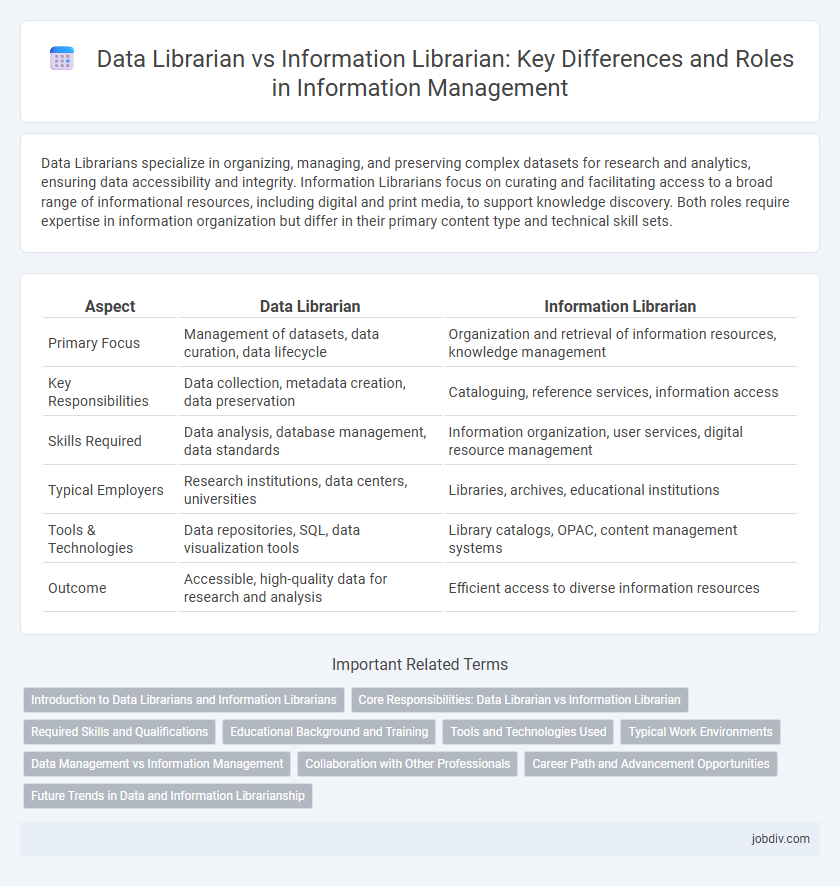Data Librarians specialize in organizing, managing, and preserving complex datasets for research and analytics, ensuring data accessibility and integrity. Information Librarians focus on curating and facilitating access to a broad range of informational resources, including digital and print media, to support knowledge discovery. Both roles require expertise in information organization but differ in their primary content type and technical skill sets.
Table of Comparison
| Aspect | Data Librarian | Information Librarian |
|---|---|---|
| Primary Focus | Management of datasets, data curation, data lifecycle | Organization and retrieval of information resources, knowledge management |
| Key Responsibilities | Data collection, metadata creation, data preservation | Cataloguing, reference services, information access |
| Skills Required | Data analysis, database management, data standards | Information organization, user services, digital resource management |
| Typical Employers | Research institutions, data centers, universities | Libraries, archives, educational institutions |
| Tools & Technologies | Data repositories, SQL, data visualization tools | Library catalogs, OPAC, content management systems |
| Outcome | Accessible, high-quality data for research and analysis | Efficient access to diverse information resources |
Introduction to Data Librarians and Information Librarians
Data librarians specialize in managing, organizing, and curating datasets, ensuring data accessibility, accuracy, and compliance with standards for research and institutional use. Information librarians focus on acquiring, cataloging, and facilitating access to diverse information resources including books, journals, and digital media across various formats. Both roles require expertise in metadata, information retrieval, and user support, but data librarians emphasize data lifecycle management while information librarians concentrate on broader knowledge and resource management.
Core Responsibilities: Data Librarian vs Information Librarian
Data Librarians specialize in managing, organizing, and curating large datasets to ensure data integrity, accessibility, and compliance with data standards for research and analytics purposes. Information Librarians focus on acquiring, cataloging, and providing access to a wide range of informational resources, including books, journals, and digital media, supporting user research and information literacy. Both roles prioritize user support but differ in the nature of their collections, with Data Librarians handling structured data and Information Librarians managing diverse informational materials.
Required Skills and Qualifications
Data Librarians require strong expertise in data management, database software, and statistical analysis, alongside proficiency in programming languages such as SQL or Python. Information Librarians emphasize skills in cataloging, information retrieval, and user services, with a strong foundation in library science and metadata standards. Both roles demand critical thinking, attention to detail, and a master's degree in library science or related fields, but Data Librarians often need additional technical qualifications related to data analytics.
Educational Background and Training
Data Librarians typically possess advanced degrees in data science, computer science, or information technology, emphasizing skills in data management, programming, and analytics. Information Librarians usually hold degrees in library and information science (LIS), focusing on cataloging, reference services, and knowledge organization. Training for Data Librarians often includes certifications in database management and data visualization, whereas Information Librarians receive instruction in archival principles and digital literacy.
Tools and Technologies Used
Data Librarians leverage advanced data management platforms such as SQL databases, data visualization tools like Tableau, and programming languages including Python and R to organize and analyze large datasets. Information Librarians primarily utilize integrated library systems (ILS) like Koha or Ex Libris Alma, digital resource management tools, and metadata standards such as MARC and Dublin Core to facilitate access to information resources. Both roles incorporate cutting-edge technologies, but Data Librarians emphasize data analytics and coding, whereas Information Librarians focus on cataloging and digital archiving software.
Typical Work Environments
Data librarians typically work in research institutions, academic libraries, government agencies, and corporate data centers, managing large datasets, metadata, and digital repositories. Information librarians are often found in public libraries, university libraries, and special libraries, focusing on organizing, retrieving, and disseminating information across various formats. Both roles require collaboration with IT professionals but differ in their primary environments due to the specialized nature of data versus general information management.
Data Management vs Information Management
Data Librarians specialize in data management, focusing on organizing, storing, and maintaining large datasets for accessibility and analysis. Information Librarians concentrate on information management, curating diverse information resources such as books, articles, and digital content to support research and knowledge dissemination. Effective data management involves structuring raw data for retrieval and use, while information management emphasizes organizing contextual knowledge and resources for user engagement and insight.
Collaboration with Other Professionals
Data librarians collaborate closely with data scientists, IT specialists, and researchers to manage and curate complex datasets, ensuring accurate data documentation and accessibility. Information librarians work alongside educators, archivists, and knowledge managers to facilitate information retrieval and support user-centric resource discovery. Both roles emphasize interdisciplinary teamwork to optimize information organization and enhance user experiences in diverse professional environments.
Career Path and Advancement Opportunities
Data librarians specialize in managing data repositories, metadata standards, and digital curation, positioning themselves for advanced roles in data governance and analytics within research institutions or corporate environments. Information librarians focus on organizing information resources, user services, and information retrieval systems, which opens pathways to leadership roles in public libraries, academic libraries, or knowledge management departments. Career advancement for data librarians often involves expertise in data science and technology integration, while information librarians may progress through managerial positions emphasizing user experience and information access innovation.
Future Trends in Data and Information Librarianship
Data librarians will increasingly focus on managing complex datasets and implementing advanced data curation tools, emphasizing skills in data analytics and machine learning integration. Information librarians will prioritize semantic technologies and AI-driven information retrieval to enhance user access to diverse digital resources. Both roles will converge around fostering data literacy and ensuring ethical management of information in an evolving digital landscape.
Data Librarian vs Information Librarian Infographic

 jobdiv.com
jobdiv.com